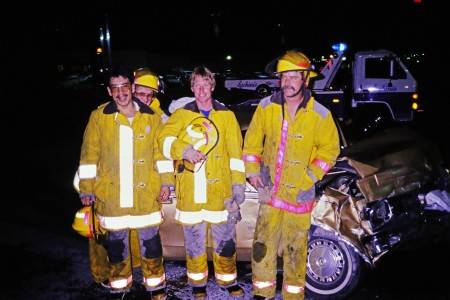TRANSPORT TO ALTERNATIVE DESTINATIONS OR RESPONSIBLE ADULTS
It is appropriate to consider alternative destinations for some patients encountered by the crisis intervention team rather than an emergency department. See EXLCUSION CRITERIA for additional information. A medically stable patient who has capacity to understand informed consent and shows understanding of their condition and potential outcomes may be a candidate for an alternative transport destination.
In general, it is appropriate to utilize a crisis intervention facility for the destination of the medically stable competent patient experiencing a mental health crisis. These include established mental health care or other appropriate health care facilities.. These facilities have exclusion criteria that is otherwise referenced in these guidelines.
There will be cases where the patient refuses to follow the recommendations of the crisis intervention team and wishes to be left in the care of other responsible adult(s). These adults may be family members or friends. The appropriateness of this decision is left to the discretion of the LIGHT team.
1. The patient must be medically stable and have capacity to understand informed consent and their condition as well as possible outcomes including negative outcomes without professional interventions not available on-scene.
2. It may be the conclusion of the crisis intervention team that the interventions delivered on-scene are sufficient to allow the patient to remain on-scene or in the care of a responsible adult without transport to a facility.
3. If it is the opinion of the team that the patient’s best interests lay in going to a facility and the patient is unwilling to follow that recommendation a refusal form should be completed, explained, and signed by the patient if they are willing.
4. The team must make a good faith determination that the person or persons the patient wishes to remain with are responsible adults who are not themselves impaired in any way and appear capable and willing to provide for the patient’s needs. This can be a challenging determination. In the end if the patient possesses capacity to make an informed consent, then there may be no alternative but to leave the patient on-scene with the person or persons he/she designates.
5. It may at times be necessary to transport the patient to a different location to meet with the chosen responsible adult the patient has designated. It would be preferable to have that individual pick up the patient from the scene but transport by the team is sometimes necessary.
6. All determinations need to be in the patient’s best interest and with the agreement of the team when possible. A refusal form should be explained and signed in cases where the recommendations of the team are unacceptable to the patient and the patient does not qualify for involuntary transport.
7. Transport to the Peak Behavioral Health facility in Santa Teresa, NM, is allowable. The Battalion Chief on duty should be notified that the team will be outside radio range/contact for a period of time.
It is appropriate to consider alternative destinations for some patients encountered by the crisis intervention team rather than an emergency department. See EXLCUSION CRITERIA for additional information. A medically stable patient who has capacity to understand informed consent and shows understanding of their condition and potential outcomes may be a candidate for an alternative transport destination.
In general, it is appropriate to utilize a crisis intervention facility for the destination of the medically stable competent patient experiencing a mental health crisis. These include established mental health care or other appropriate health care facilities.. These facilities have exclusion criteria that is otherwise referenced in these guidelines.
There will be cases where the patient refuses to follow the recommendations of the crisis intervention team and wishes to be left in the care of other responsible adult(s). These adults may be family members or friends. The appropriateness of this decision is left to the discretion of the LIGHT team.
1. The patient must be medically stable and have capacity to understand informed consent and their condition as well as possible outcomes including negative outcomes without professional interventions not available on-scene.
2. It may be the conclusion of the crisis intervention team that the interventions delivered on-scene are sufficient to allow the patient to remain on-scene or in the care of a responsible adult without transport to a facility.
3. If it is the opinion of the team that the patient’s best interests lay in going to a facility and the patient is unwilling to follow that recommendation a refusal form should be completed, explained, and signed by the patient if they are willing.
4. The team must make a good faith determination that the person or persons the patient wishes to remain with are responsible adults who are not themselves impaired in any way and appear capable and willing to provide for the patient’s needs. This can be a challenging determination. In the end if the patient possesses capacity to make an informed consent, then there may be no alternative but to leave the patient on-scene with the person or persons he/she designates.
5. It may at times be necessary to transport the patient to a different location to meet with the chosen responsible adult the patient has designated. It would be preferable to have that individual pick up the patient from the scene but transport by the team is sometimes necessary.
6. All determinations need to be in the patient’s best interest and with the agreement of the team when possible. A refusal form should be explained and signed in cases where the recommendations of the team are unacceptable to the patient and the patient does not qualify for involuntary transport.
7. Transport to the Peak Behavioral Health facility in Santa Teresa, NM, is allowable. The Battalion Chief on duty should be notified that the team will be outside radio range/contact for a period of time.
